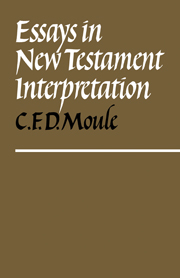Book contents
- Frontmatter
- Contents
- Foreword
- Acknowledgements
- Abbreviations
- Jesus in early Christian interpretation
- Studies in the Gospels
- Two studies in the Epistles
- Two linguistic studies
- Studies exegetical, doctrinal and ethical
- 12 The influence of circumstances on the use of christological terms
- 13 The influence of circumstances on the use of eschatological terms
- 14 St Paul and ‘dualism’: the Pauline conception of resurrection
- 15 A reconsideration of the context of maranatha
- 16 II Cor. iii.18b, καθάπερ ἀπὸ κυρίου πνεύματος
- 17 Punishment and retribution: an attempt to delimit their scope in New Testament thought
- 18 The theology of forgiveness
- 19 Obligation in the ethic of Paul
- 20 ‘…As we forgive…’: a note on the distinction between deserts and capacity in the understanding of forgiveness
- 21 The sacrifice of the People of God
- Index
16 - II Cor. iii.18b, καθάπερ ἀπὸ κυρίου πνεύματος
Published online by Cambridge University Press: 05 November 2011
- Frontmatter
- Contents
- Foreword
- Acknowledgements
- Abbreviations
- Jesus in early Christian interpretation
- Studies in the Gospels
- Two studies in the Epistles
- Two linguistic studies
- Studies exegetical, doctrinal and ethical
- 12 The influence of circumstances on the use of christological terms
- 13 The influence of circumstances on the use of eschatological terms
- 14 St Paul and ‘dualism’: the Pauline conception of resurrection
- 15 A reconsideration of the context of maranatha
- 16 II Cor. iii.18b, καθάπερ ἀπὸ κυρίου πνεύματος
- 17 Punishment and retribution: an attempt to delimit their scope in New Testament thought
- 18 The theology of forgiveness
- 19 Obligation in the ethic of Paul
- 20 ‘…As we forgive…’: a note on the distinction between deserts and capacity in the understanding of forgiveness
- 21 The sacrifice of the People of God
- Index
Summary
The main conclusion reached in this note, completed in July 1970, though entertained by me for many years past (see note 29, p. 234), has now been anticipated in print by my friend and pupil, J. D. G. Dunn, in his article ‘2 Corinthians III. 17 – “the Lord is the Spirit”’, J.T.S. n.s. 21 (1970), 309 ff. He there paraphrases II Cor. iii. 18b by: ‘Such is the influence of the Lord, who, as we have already said, is Spirit’ (318). But perhaps it is still worth while for me to offer the note as originally drafted, partly because it shows that two students of Paul have, more or less independently, reached the same conclusion, and partly because my interpretation of the eschatological implications of this passage are not quite identical with Dr Dunn's.
The passage leading up to and including this cryptic phrase is one of the most elaborately studied of all New Testament cruces. (Incidentally, it should be recognized that the passage stretches to iv. 6.) One of the fullest and finest studies is that of Ingo Hermann;but there is an immense literature on it, and it is no intention of this note to traverse all the ground again, nor to re-open the much-debated question of Paul's opponents and the setting of this chapter in his conflict with them.
- Type
- Chapter
- Information
- Essays in New Testament Interpretation , pp. 227 - 234Publisher: Cambridge University PressPrint publication year: 1982
- 1
- Cited by

